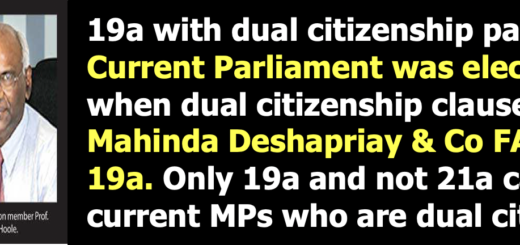5 Months. 35 Agreements- Has the JVP-NPP signed away Sri Lanka’s Sovereignty?

In just five months, the JVP-NPP-led government under President Anura Kumara Dissanayake signed 35 agreements with India — the largest, fastest foreign policy shift in Sri Lanka’s post-independence history.
What was promised as a new era of transparency, sovereignty, and people-first governance has instead raised urgent questions:
- Who really benefits from these deals?
- Was Parliament consulted?
- Are we now India’s satellite in the Indian Ocean?
This is not partnership. This is strategic entrapment.
Sri Lankans must now ask:
Was our sovereignty sold in exchange for survival — or surrendered without resistance?
The 35 Indo-Lanka Agreements (Dec 2024 – April 2025):
Condensed Summary & Comparison with Predecessors
Part 1 – The Agreements Themselves
Overview:
35 MoUs and agreements signed in rapid succession across sectors:
- Energy (Trincomalee tank farms, grid integration)
- Ports (Trincomalee, KKS, Colombo West Terminal)
- Airports (Palaly redevelopment)
- Maritime & digital surveillance
- Agriculture, education, tourism, pharmaceuticals, archaeology
- Fintech and digital ID platforms
Unprecedented scale: No previous government signed this many bilateral deals in such a short period with any single foreign country.
Part 2 – Strategic Impact on Sovereignty
Key Insight:
The agreements dilute Sri Lanka’s decision-making autonomy in:
- Strategic ports and harbors
- National energy infrastructure
- Defense surveillance and security data
- Cultural heritage & religious tourism
Comparison: Even under pro-Western or India-leaning administrations (Yahapalana 2015–19 or Sirisena-Rajapaksa 2019–2024), strategic deals were more cautious, staggered, and often faced parliamentary or legal scrutiny. The JVP/NPP government has bypassed both.
Part 3 – Strategic entrapment vs regional partnership
Core Argument:
While sold as “partnership”, the pacts create:
- Dependency loopsin digital and energy infrastructure
- Permanent Indian institutional presence
- Terms that benefit Indian companies withfew local benefits
Has Sri Lanka lost its renowned role as a non-aligned state —is it becoming a satellite of India, without the protections of formal alliance.
Comparison: Past governments balanced relations with China and India or West and India — the JVP/NPP regime has tilted entirely and blindly toward India.
Part 4 – From Anti-Imperialism to Indian Alignment
Political Betrayal:
The JVP — once fierce critics of foreign domination — are now:
- Facilitators of Indian capital, diplomacy, and strategic policy
- Silent on sovereignty, transparency, and external control
- Promoters of what they once called“neo-imperialism”
Comparison: The JVP led protests against Indian intervention in the 1980s. Today, they are signing agreements that exceed even the Indo-Lanka Accord in reach.
Part 5 – Legal & Constitutional Concerns
Key Legal Issues:
- No parliamentary debate
- No national security review
- No Supreme Court interpretation on sovereignty-impacting clauses
- Potential violation ofArticles 1, 2, 3, and 157 of the Constitution
Comparison: Previous governments faced judicial scrutiny (e.g., MCC under Yahapalana). These 35 deals passed without legal challenge, raising legitimacy questions.
Part 6 – Geopolitical Risks & Strategic Precedents
Bigger Picture:
- India now shapes Sri Lanka’sIndian Ocean posture, BIMSTEC presence, and energy routes
- Indian private and state actors are being institutionalized in Sri Lanka
- Sets a precedent for other foreign actors to demand similar access
Comparison: Previous administrations tried to balance India and China — the JVP/NPP gave India unilateral privileges, risking long-term diplomatic imbalance.
Part 7 – An urgent appeal to JVP/NPP Leadership
A moral and political reckoning:
- JVP-NPP campaigned onsovereignty, justice, and anti-imperialism
- JVP-NPP now stand accused of themost sweeping surrender of national autonomy
- History will remember whether you correct this course — or double down
Comparison: Past governments may have been pragmatic or pressured, but the JVP/NPP came to power promising a people-first, country-first revolution — and now face the starkest betrayal of their own legacy.
The most sovereignty-compromising administration since Independence?
While past governments may have erred or compromised in parts, none have conceded strategic control to a foreign power across this many sectors, this quickly, without any remorse.
The JVP/NPP must now choose:
- Course-correctand return to its foundational principles
- Or be remembered as theregime that delivered Sri Lanka into strategic subservience under the cover of reform
History will not forget. And the people will not forgive.
A word to JVP/NPP supporters
This is not the time to blindly defend leadership or stay distracted by short-term economic optics.
- The cost of silence today will be strategic loss tomorrow.
- The betrayal of sovereignty cannot be justified by promises of digital ID cards, rooftop solar panels, or “recovery”.
- You campaigned for change, not compromise.
Hold your leaders accountable — not as enemies, but as patriots.
A call to All Sri Lankans
If we remain silent, preoccupied with day-to-day survival, distracted by political drama, we risk waking up to a country:
- Militarily bound to a regional hegemony
- Digitally governed by foreign systems
- Economically tied to foreign monopolies
- And powerless to say no in our own Parliament
It won’t matter who is President then. The Parliament will be ceremonial. Elections will be irrelevant or a mere theatre.
The system will already be foreign-owned
Speak now — or be ruled forever in silence.
Shenali D Waduge







